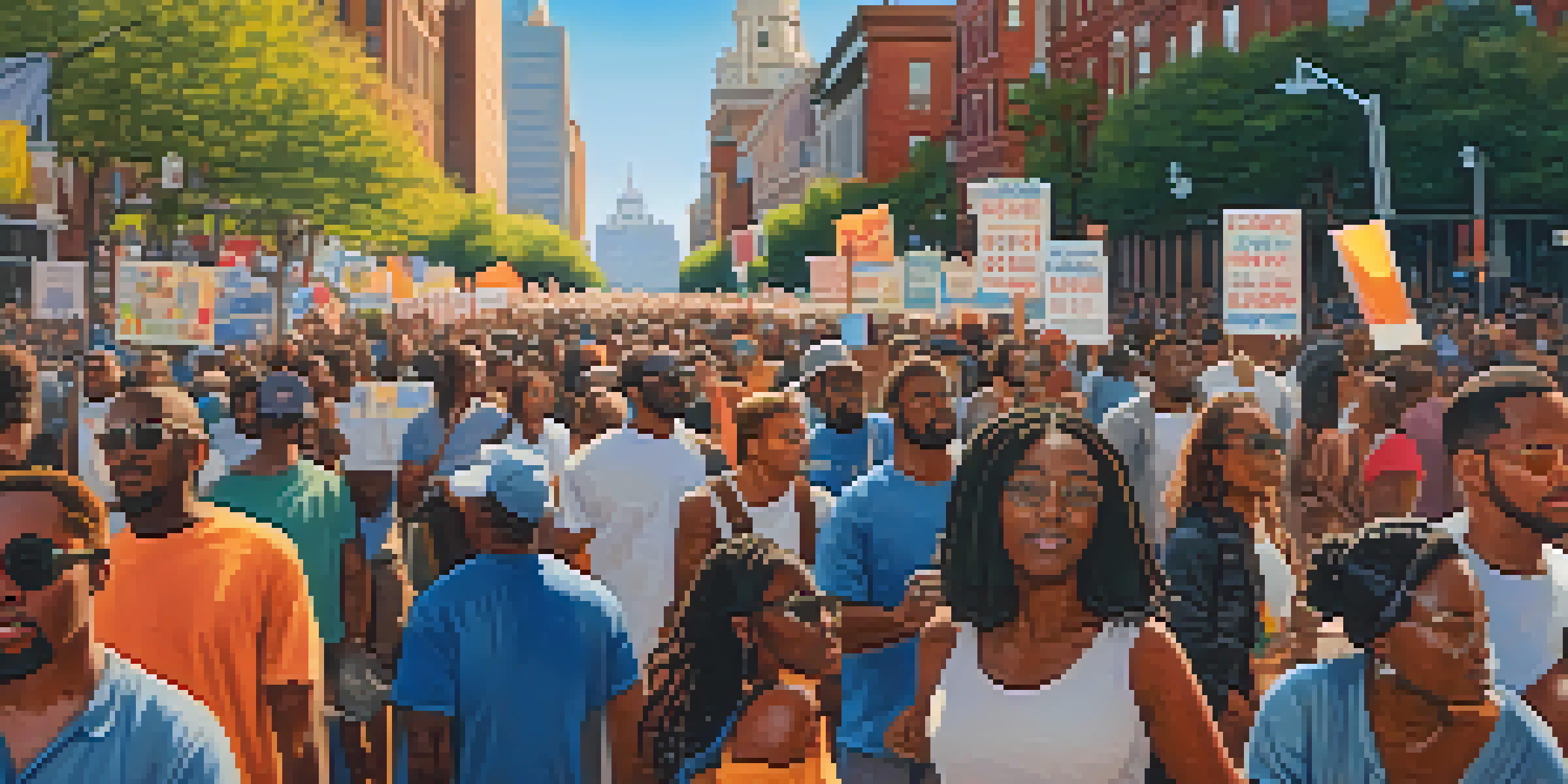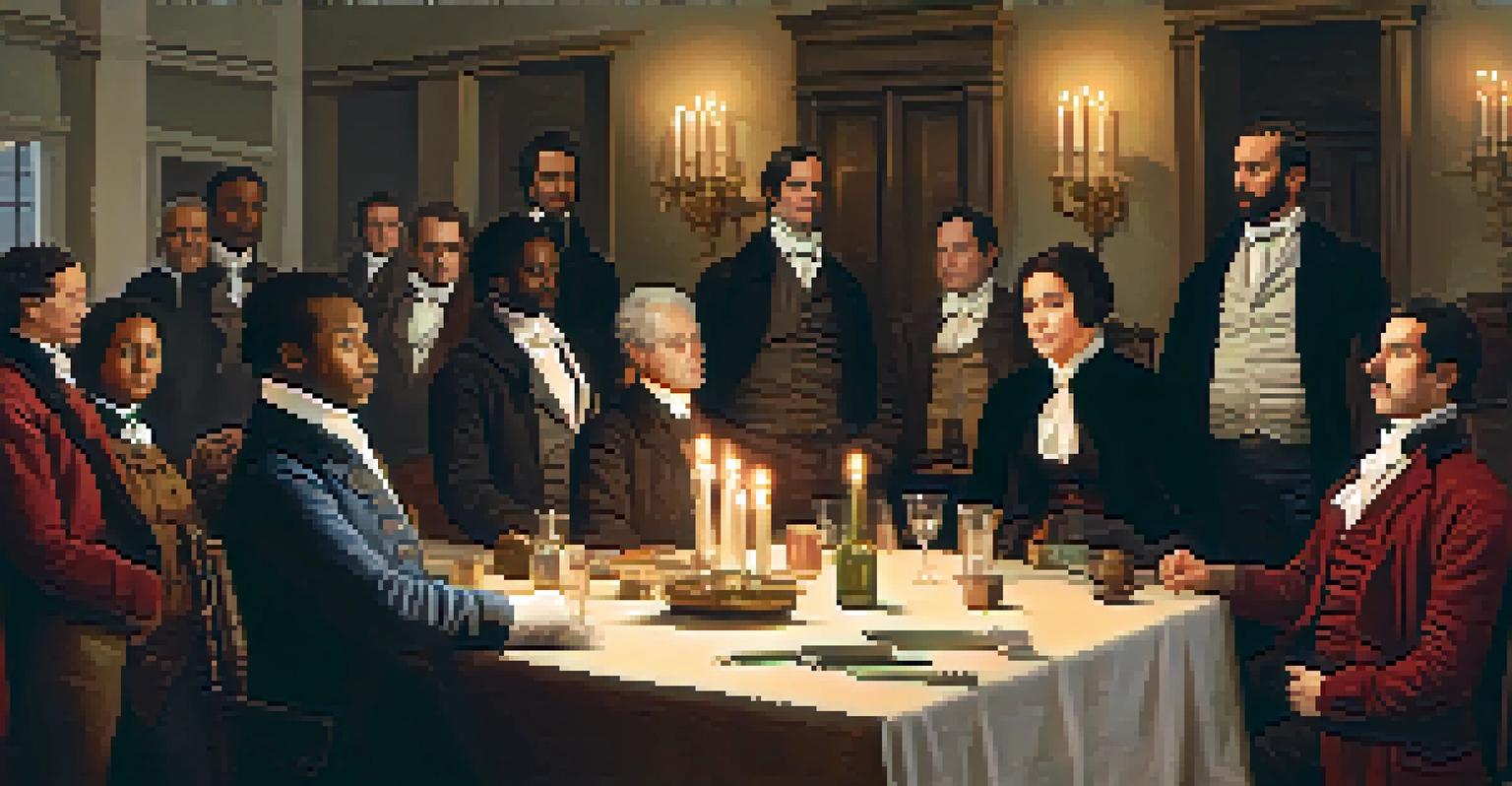Political Movements: Philadelphia's Role in Social Change

The City of Brotherly Love: A Historical Overview
Philadelphia, known as the City of Brotherly Love, has a rich history that is deeply intertwined with social and political movements. Founded in 1682, it became a melting pot of ideas and cultures, making it a natural hub for activism. From the drafting of the Declaration of Independence to the abolitionist movement, Philadelphia has always been at the forefront of change.
Injustice anywhere is a threat to justice everywhere.
The city’s role as the meeting point for influential thinkers and activists helped shape pivotal moments in American history. For example, the First and Second Continental Congresses were held here, setting the stage for a revolution. This spirit of collaboration continues to resonate today, as the city fosters an environment where diverse voices can come together to advocate for change.
Philadelphia's rich tapestry of history not only highlights its past but also sets the tone for ongoing social movements. As we delve deeper into the city's political landscape, we’ll explore how its legacy influences current activism and inspires future generations.
The Abolition Movement: Philadelphia's Pioneering Role
In the 19th century, Philadelphia emerged as a beacon for the abolitionist movement, advocating for the end of slavery. The city hosted the first national abolitionist convention in 1833, bringing together passionate activists who sought to dismantle the institution of slavery. This gathering marked a significant turning point in the fight for African American rights.

Prominent figures like Frederick Douglass and William Lloyd Garrison made their voices heard in Philadelphia, rallying support and igniting the fervor for change. The city was not only a meeting ground but also a refuge for escaped slaves, further solidifying its role in the quest for freedom. These efforts demonstrated the power of collective action and the importance of solidarity in achieving social justice.
Philadelphia: A Hub of Activism
Philadelphia's rich history of social and political movements has positioned it as a vital center for activism and change.
Today, Philadelphia's legacy in the abolition movement serves as a reminder of the ongoing struggle for equality. It highlights how a community can unite against injustice, inspiring modern movements that continue to fight for civil rights and social equity.
Labor Movements: Philadelphia's Historic Struggles
Philadelphia has a storied history of labor movements, particularly during the industrial revolution. As factories and mills grew, so did the need for workers to band together for fair wages and better working conditions. This led to the formation of numerous labor unions, making Philadelphia a central hub for worker rights.
The arc of the moral universe is long, but it bends toward justice.
One notable event was the 1835 shoemakers’ strike, which marked one of the first organized labor actions in the country. Workers demanded fair pay and reasonable hours, setting a precedent for future labor movements. The city's factories became a battleground for labor rights, with workers fighting for dignity and respect in the workplace.
The legacy of these labor movements continues to influence today’s workforce. Philadelphia serves as a reminder of the importance of collective bargaining and the ongoing fight for workers' rights, reflecting a broader struggle that transcends time and geography.
Civil Rights Movement: Philadelphia's Activism
During the Civil Rights Movement of the 1960s, Philadelphia played a crucial role in the fight against racial segregation and discrimination. Local activists organized protests, sit-ins, and marches, demanding equal rights for African Americans. The city became a focal point for change, exemplifying the power of grassroots activism.
One of the notable figures emerging from this era was Cecil B. Moore, a prominent civil rights leader. His relentless advocacy for desegregation in schools and public spaces galvanized the community, inspiring others to join the cause. Philadelphia’s activism during this period was instrumental in shaping national policies and attitudes toward civil rights.
Abolition Movement's Legacy
The city's pioneering role in the abolition movement laid the groundwork for ongoing struggles for equality and civil rights.
The echoes of the Civil Rights Movement still resonate in Philadelphia today, reminding us of the importance of standing up against injustice. As contemporary movements continue to address systemic racism, the city's history serves as a powerful reminder of the progress made and the work that still lies ahead.
LGBTQ+ Rights: Philadelphia's Pioneering Spirit
In the fight for LGBTQ+ rights, Philadelphia has been at the forefront since the late 20th century. The city hosted one of the first Pride marches in 1972, showcasing its commitment to equality and acceptance. This event laid the groundwork for a vibrant LGBTQ+ community that continues to thrive today.
Philadelphia has become a sanctuary for LGBTQ+ individuals, offering a supportive environment where diverse identities are celebrated. The annual Philadelphia Pride Parade and Festival draws thousands, highlighting the importance of visibility and representation. Activism in the city has helped to push for significant legal advancements, including marriage equality.
As we reflect on Philadelphia's role in the LGBTQ+ rights movement, it becomes clear that the city embodies resilience and hope. The ongoing quest for equality and acceptance inspires new generations to advocate for change, ensuring that every voice is heard and valued.
Environmental Movements: A Greener Philadelphia
In recent years, Philadelphia has increasingly focused on environmental activism, striving to create a more sustainable future. Grassroots movements have emerged, advocating for clean air, green spaces, and environmentally-friendly policies. The city's commitment to sustainability reflects a growing awareness of the impact of climate change.
Organizations like the Philadelphia Environmental Justice Advisory Board have been instrumental in addressing environmental inequalities, ensuring that marginalized communities have a voice in decision-making. Community gardens and local clean-up initiatives have become popular, engaging residents in hands-on efforts to beautify their neighborhoods and promote environmental stewardship.
Education Fuels Social Change
Educational institutions in Philadelphia have been instrumental in fostering activism, empowering students to advocate for justice.
As we look towards the future, Philadelphia's environmental movements serve as a blueprint for other cities facing similar challenges. The collective effort to create a greener city not only enhances quality of life but also fosters a sense of community and responsibility among its residents.
The Role of Education in Activism
Education has played a pivotal role in fostering social change in Philadelphia. Schools and universities have long been incubators for activism, encouraging students to engage with pressing societal issues. Through programs and initiatives, young people are empowered to become advocates for change within their communities.
Institutions like the University of Pennsylvania and Temple University have a rich history of student activism, with students often at the forefront of political movements. From protests to educational campaigns, the spirit of activism is woven into the fabric of the city's educational landscape. This engagement cultivates critical thinking and inspires future leaders to challenge the status quo.

As we consider Philadelphia's role in shaping social movements, it's clear that education is a powerful tool for change. By encouraging dialogue and activism, the city continues to nurture a new generation committed to advocating for justice and equality.